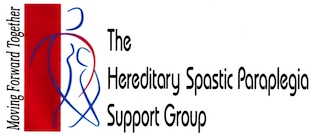HSP symptoms

Symptoms
HSP is an incredibly difficult condition to predict. Not everyone will have the same symptoms or to the same severity or timescale. Some people have a very slow and steady progression, some may see a sharp decline then plateau, some may have hardly any issues at all, while others may go from being able bodied to wheelchair bound over a short number of years. HSP has no set pattern or timescale, the following list is a guide to symptoms which are commonly encountered. Most individuals will only experience a few of these.
Around 90% of people with HSP have an uncomplicated, or ‘pure’ form (for more information on Pure and Complicated HSP see HSP Types). This means that symptoms are typically confined to:
- Lower limb weakness
- Involuntary spasms / cramps
- Increased muscle tone and stiffness (spasticity)
- Urinary problems – such as a frequent sense of urgency
- A loss of sensation in the feet (sometimes)
- Fatigue
- Pain
- Lower limb weakness
- Digestive and bowel problems
Other symptoms can include bowel issues, loss of balance, loss of sensation in the feet, and/or pins and needles. The muscle spasticity may also cause toes to curl under and the arch of the foot to change.
People with uncomplicated HSP can usually live a full and independent life, although some adaptions and mobility aids may be required as symptoms progress.
The remaining 10% have a complicated or complex form of HSP. In these types of HSP the symptoms are the same as uncomplicated/pure HSP, but people would have other additional symptoms which may be one or more of:
- Nerve damage in the feet or other extremities (peripheral neuropathy)
- Epilepsy
- Problems with balance, co-ordination and speech (ataxia)
- Eye problems – such as damage to the retina (retinopathy) and damage to the optic nerve (optic neuropathy)
- Memory issues
- Dementia
- Ichthyosis – a condition that causes widespread and persistent thick, dry, "fish-scale" skin
- Learning and developmental problems
- Hearing loss
- Speech, breathing or swallowing problems.
With some of these additional symptoms, complicated HSP can be life limiting.


Emotional and mental health impact
It should also be noted that people with a physical, lifelong condition such as HSP may also be prone to emotional and mental health issues such as:
- Anxiety
- Depression
- Panic attacks
- Low self esteem.
Mental health issues are just as important to treat as physical issues. If you are dealing with any of these problems, please visit your GP.
